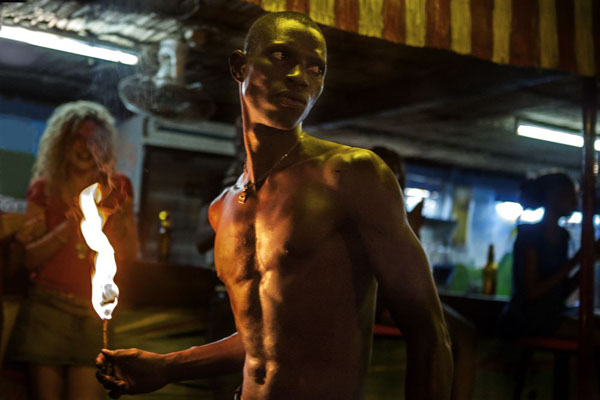The Cannes Film Festival is just over a week away now, and film critic, programmer, and oddsmaker Neil Young has updated his list of contenders for the Palme d’or, weighing the odds for each. Looking good in Neil’s eyes right now are Mahamat-Saleh Haroun‘s Grigris, the subject of Guy Lodge‘s ongoing “Cannes Check 2013” project today at In Contention, where he’s extensively previewing every film in Competition; Asghar Farhadi’s The Past; Hirokazu Kore-eda’s Like Father Like Son; and James Gray’s The Immigrant.
The first review of Sofia Coppola’s The Bling Ring, set to open Un Certain Regard, is out, and it’s by none other than Kent Jones, who writes in Film Comment, “Unlike Spring Breakers, with which the film will inevitably be compared (alongside Schrader’s The Canyons), The Bling Ring goes about its business quietly but with a tremendous purity of focus. The film casts such a lovely spell that its full force may hit only after the lights come up.” He also suggests that one might call Coppola “a neorealist of hyper-materialist life.”
For live video highlights throughout the festival, running from May 15 through 26, tune into TV Festival de Cannes.
In other news. Observer film critic Philip French filed his first review in 1963, and he’ll file his last in August (and here‘s a collection of his favorite films of all time) . Vanessa Thorpe: “After an illustrious half century, French, who was honored with an OBE in January, has decided to step down following his 80th birthday the same month.”
Speaking of honors, Wong Kar-wai is now a Commander of France’s Order of Arts and Letters.
“The 20th edition of Hot Docs concluded this weekend with 11 awards and $89,000 in cash and prizes being presented to Canadian and international filmmakers,” reports Indiewire‘s Peter Knegt. “Jason DaSilva’s When I Walk—in which the filmmaker grippingly documents his own seven-year struggle with a severe form of multiple sclerosis—led the Canadian winners, while Inigo Westmeier’s Dragon Girls—about the students that train in the ancient Shaolin Kung Fu discipline at a school outside Beijing—led with the international crop.” And he’s got the full list of winners.
Reading. For the BFI, Chris Robinson talks with Don Hertzfeldt about It’s Such a Beautiful Day, which Nick Bradshaw calls “a passion play about the bewilderment, traumas and grace of an everystickman named Bill.”
“Produced in the early spring of 2012, [Zoe] Beloff’s The Days of the Commune is full of playful and important adaptations,” not the least of which, of course, is Brecht’s play. Jason Livingston: “She cast professional and non-professional actors alike, with only a requirement that each person possess ‘enthusiasm and a loud voice,’ along with a willingness to swap roles, hold signs and props, and adapt to changing weather, as each shoot would take place over a weekend at multiple locations. In the spirit of OWS, Beloff committed to run-and-gun guerilla filmmaking, no permits asked, none taken. To her surprise, it worked.”
Also in the new Brooklyn Rail, Jonathan Andrews notes that Jean-Marie Straub and Danièle Huillet’s Class Relations (1984) confronts “the viewer with the power disparities and exploitation inherent in our late-capitalist mode of production.” Lucas Hnath’s play A Public Reading of an Unproduced Screenplay About the Death of Walt Disney is on at Soho Rep through May 26, and Heidi Schreck sits in on a rehearsal. Plus: “Delusion to Delusion to Delusion: How I Wrote a Movie and Then Got it Made” by Halley Feiffer, co-writer of He’s Way More Famous Than You.
“Who’s the best director working today under the age of 40?” asks Matt Singer and the Criticwire network offers a wide range of replies.
Nihon Cine Art is running Robert Nishimura‘s translation of an interview with Akio Jissoji: “Its main focus is Jissoji’s fourth ATG movie, Life of a Court Lady [1974]. Since there’s so little information about Jissoji in the West this interview stands out as the longest testimony we ever had about the man itself.”
Hollywood conservatives are rattled to discover that one of their partying social networkers is not David Stein, but David Cole, Holocaust revisionist. Rory Carroll reports in the Guardian.
Comrade Kim Goes Flying, the “first fiction feature shot in North Korea and co-produced by both Western and North Korean companies…, sidesteps current political tensions to offer a spunky comedy about a female coal miner (Kim Yong Mi) who dreams of becoming a circus acrobat.” Doug Cummings, who’s relaunched Filmjourney.org, talks with co-producer Nicholas Bonner for the LA Weekly.
Obit. “Mike Gray, a writer and filmmaker who tackled thorny contemporary issues in his work, including race relations in Chicago, American drug policy and, most notably, the safety of nuclear power plants—the subject of the 1979 film The China Syndrome, for which he wrote the original screenplay—died on Tuesday at his home in Los Angeles,” reports Bruce Weber in the New York Times. “He was 77.”
More browsing? Check in with the Film Doctor and John Wyver.
For news and tips throughout the day every day, follow @KeyframeDaily on Twitter and/or the RSS feed. Get Keyframe Daily in your inbox by signing in at fandor.com/daily.




